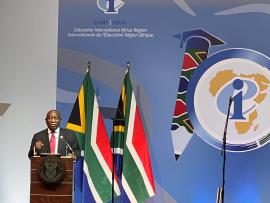
President Cyril Ramaphosa has highlighted the urgent need for global unity in ensuring equal access to education for all, particularly amidst ongoing instability.
The President was speaking at the Education International 10th Africa Regional Conference held at the Sandton Convention Centre in Johannesburg on Tuesday.
Education International Africa Region is holding its 10th Regional Conference in Johannesburg. About 400 delegates, observers, and guests from across and beyond the region are attending the conference.
President Ramaphosa lauded the conference organisers for their commitment to advancing education, particularly in times of crisis, which is crucial for the future of the African continent and the world.
The President told delegates that as nations navigated the turbulent waters brought by the COVID-19 pandemic, the world was confronted with political upheavals and conflicts.
“These crises further strained our social fabric, affecting the livelihoods of countless individuals and denying many children their fundamental right to education. In these times of instability, it is even more critical for nations to stand united in pursuit of equal access to education for all.
“Education is the cornerstone upon which societies build their future. Through education, we cultivate respect for human rights, the rule of law and the principles of democracy,” the President said.
President Ramaphosa said the work of the UN High-Level Panel on the Teaching Profession, which demonstrates the adaptation of education systems to a rapidly changing world, is one of the most important tasks of the moment.
The panel draws expertise from diverse stakeholders, including Ministers of Education, labour representatives, teacher unions and civil society organisations, and includes South Africa's own Minister of Basic Education, Angie Motshekga. It's main objectives underscore the importance of educators’ voices in finding solutions to educational challenges.
“Educators play a fundamental and irreplaceable role in shaping our societies, and their insights are invaluable in our quest for sustainable solutions. Curriculum reform that responds to the changing world of work is another vital task.
“In South Africa, we are on the brink of a significant educational reform with the implementation of the Coding and Robotics curriculum from Grade R to Grade 9.
“This initiative is part of our broader strategy to integrate STEAM [science, technology, engineering, arts and maths] subjects into our education system. By doing so, we aim to equip our learners with the digital skills necessary to thrive in a fast-paced world,” President Ramaphosa said.
Decolonising education
The President said that the decolonisation of education has become increasingly important.
He added that the discussions at this conference, focusing on tackling racism, decolonising education and promoting democracy, human rights and trade union rights, could not be more timely.
“The project of decolonising education in Africa is not just a matter of academic interest. It is a pressing need. We must challenge colonial theories and practices to build resilient education systems that are centred on African perspectives and experiences.
“This requires a shift away from a Eurocentric worldview to embrace a more diverse and inclusive perspective.
“We must acknowledge and value the knowledge systems of all peoples and integrate them into our curricula and knowledge selection processes,” the President said.
He said the responsibility to nurture and defend the right to education extends to all parts of society.
The President called on labour movements, civil society organisations and non-governmental organisations operating within the educational sphere to collaborate to protect this critical space.
Through such partnerships, he said, the world can prepare learners to be active, informed citizens in democratic societies.
“The role of organisations, such as Education International, are vital. As advocates for quality education, your mission is to ensure inclusive and equitable learning opportunities for all.
“We know that quality education is not just a matter of access. What is also needed are safe, conducive environments where the rights of all learners are respected and upheld.
“By improving access to education, we can alleviate poverty and empower marginalised communities, unlocking their potential and contributing to the development of nations,” he said. – SAnews.gov.za


